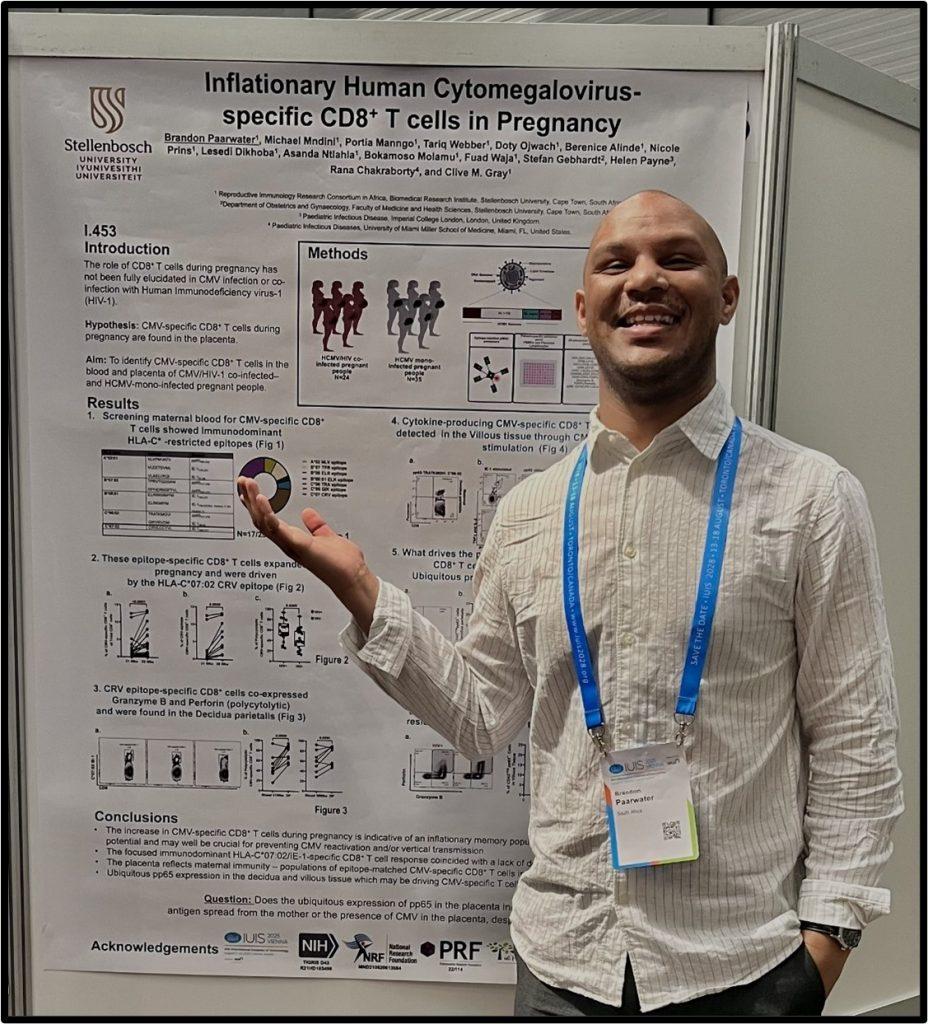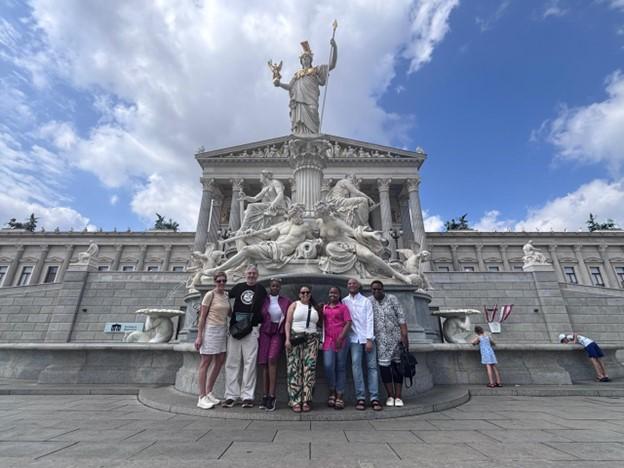Brandon Paarwater – TIGRIS Awardee and RIRCA PhD Candidate
Introduction
The IUIS brings together immunologists from all over the world, showcasing all the various niches of Immunology, whether it’s inflammation, neuroimmunology, autoimmunity, cancer or tissue immunology. Here, the global immunology community unites not only to share knowledge and the latest key findings, but also to expand our understanding of immunity in the context of health and disease. But strongly fostering collaboration to improve health worldwide, as outlined in the mission statement of the IUIS. I attended the IUIS2025, the 19th Congress of Immunology, held in Vienna, Austria, to expand my horizons in immunology as a young scientist and to be inspired by the pioneers in the field. I am privileged and honoured to be a TIGRIS scholar, who sponsored my experience at IUIS 2025.
Inflationary Human Cytomegalovirus-specific CD8+ T cells in pregnancy
I had a poster presentation where I discussed some of our findings on Cytomegalovirus (CMV)-specific CD8+ T cells that are not only present in the blood of pregnant women living with the Human Immunodeficiency virus-1 and co-infected with the cytomegalovirus, but also in the placenta. Moreover, these CMV-specific CD8+ T cells exhibit a unique phenotype during pregnancy and overall, the T cell immune landscape. I enjoyed explaining what we do at the Reproductive Immunology Research Consortium in Africa (RIRCA) as well as how unique our study cohorts are.
I also realised how small the poster section was for Reproductive Immunology compared to the other topics. This highlights the need for more scientists to study immune responses at both the maternal and foetal levels. Sharing my PhD findings boosted my confidence as the questions posed about the work and the future directions of the study opened up my mind to look at the data with a fresh perspective.
Scientific highlights
One of the key highlights of the conference was to interact with Professor Yasmine Belkaid, Institut Pasteur, Paris. I have followed Prof. Belkaid’s work over the years as a postgraduate and have watched her talks via YouTube. She is known for her work on host-microbe interactions in tissues and the immune regulation of microbes. What was striking is that her current research focuses on maternal immunity, concentrating on the impact of inflammation on the mother-child dyad. The work she presented highlighted that optimal lactation depends on maternal immunity and that there is a delicate balance between the maternal immune status and inflammatory challenges. Reproductive Immunology is central to understanding how the immune system is shaped in utero, as well as during the early days of life. Furthermore, it can also aid in our current understanding of how the immune system is modulated from birth and possibly predict immune development and modulation as we age.
One of the IUIS Rising Stars 2025, Dr Thomas Krausgruber from the Medical University of Vienna, had a fascinating talk about the role of non-hematopoietic structural cells in tissue immunity. Here, he discussed the mapping of tissue immunity using multi-omics platforms, including spatial sequencing, RNA sequencing, ATAC sequencing, and flow cytometry. Data integration from these multi-omics platforms generates a systems immunological model of structural cell immune functions in tissues. This provoked the thought of the structural cells that can be found in the placenta and how they interact with T cells in particular during viral infections. These cells are often understudied or overlooked when we study tissue-specific immune responses in the placenta. The question, of course, would be what tissue-specific roles of structural cells would be and how the T cell immune dynamics are shaped.
The plenary talk by Professor Miriam Merad, from the Icahn School of Medicine at Mount Sinai, was really intriguing, as there was emphasis on studying resident immune cells in their respective tissue microenvironment. Prof. Merad is known for her identification of a tissue-resident macrophage lineage, which redefined the understanding of cancer immunity. Her talk sparked a discussion again on the role of tissue-resident immune cells that can be found in the placenta. Moreover, these cells appear only for the duration of pregnancy as the placenta is a temporary organ. Lastly, her talk inspired me to think about the translational potential of research and how we reach the stage where our scientific discoveries are applied.
Collectively, I have gained great insight from all the talks I attended. Whether it was about dendritic cells or allergies, it reminded me of the importance of Immunology in health and disease and that it truly is the future of Medicine.
A slightly disappointing point was that Reproductive Immunology did not have an official scientific programme highlighting the recent discoveries. Hopefully, at IUIS 2028, we will see brilliant talks that encapsulate this unique niche of Immunology.
Expanding the Immunology borders: Networking & Collaboration
During the Reproductive Immunology poster presentation session, I had the opportunity to meet fellow PhD researchers from predominantly European countries. We discussed the similarities and differences between our research, identified potential gaps, and explored how these could be addressed. It was fascinating to see the animal models used to study specific adverse birth outcomes and how the work was also conducted in human subjects. I also had discussions with scientists from South America, discussing the type of research conducted and how the Immunology community is shaped – there were many similarities with South Africa. The FAIS symposium also demonstrated that African immunology can compete with the rest of the world and that we should foster and support collaboration on our own continent.
Wien left a long-lasting impression!
I thoroughly enjoyed what Vienna had to offer, from the parks to the rich history. I was in awe and would definitely go back one day! Overall, IUIS 2025 was one of the major conferences I will remember as part of my postgraduate journey. I am genuinely grateful for the opportunity to represent RIRCA and Stellenbosch University.
I am applying the aspects that I have learned to both my personal and professional growth. Professionally, I am close to the finish line of my PhD, which allows me to think of future research ideas and where I see myself within the field in the next five years.
To conclude, one fundamental message from IUIS2025 is that as scientists, we must share our discoveries with the public and actively participate in scientific outreach initiatives.
Article by Brandon Paarwater












